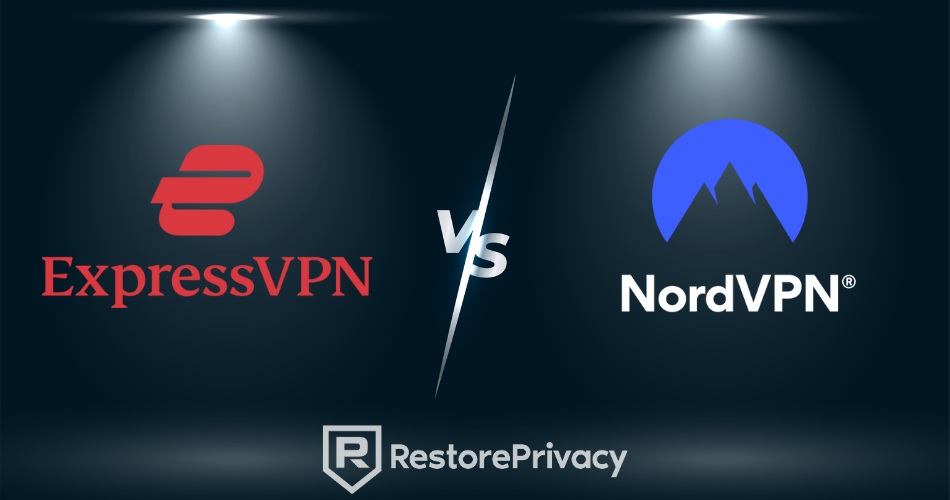
ExpressVPN and NordVPN are both popular, but our recent tests revealed a very clear winner with speeds, privacy features, and streaming capability.
ExpressVPN and NordVPN are probably the two most well-known VPNs on the market. Each has millions of satisfied users, along with countless recommendations from various websites and experts. Deciding between these two VPNs can be challenging since both are leaders in the VPN space.
To give us a clear answer on which VPN is best, we ran both NordVPN and ExpressVPN through numerous back-to-back tests. Fortunately, the test results and analysis give us a clear answer. All of the test results are posted below in 12 different categories.
The table below highlights the key facts about each VPN service, and also includes discount coupons for each VPN:
| ExpressVPN | NordVPN | |
| Website | ExpressVPN.com | NordVPN.com |
| Location | British Virgin Islands | Panama |
| Servers | 3,000+ | 6,300+ |
| Countries | 105 | 111 |
| Logs | No logs (audited) | No logs (audited) |
| Torrenting | All servers | All servers |
| Support | Knowledge Base; 24/7 live chat | Knowledge Base; 24/7 live chat |
| Apps for | Windows, macOS, Linux, Android, iOS | Windows, macOS, Linux, Android, iOS |
| Price | $6.67 (with coupon below) | $2.99 (with coupon below) |
| Coupon | 49% Off Coupon > | 74% Off Coupon > |
Below are the different test categories we examined for this NordVPN vs ExpressVPN comparison report:
- VPN Apps
- Speeds
- Reliability
- Features
- Security
- Logging Policies
- Jurisdiction
- Torrenting
- Netflix and Streaming
- Price
- Payments and Refunds
- Value
Lastly, we will wrap up this comparison with some FAQs and our conclusion and recommendations from this battle of ExpressVPN vs NordVPN.
Now let’s get into the in-depth test results for this comparison guide. First up are the speed tests.
VPN Apps Comparison with ExpressVPN and NordVPN
| NordVPN | ExpressVPN | |
| Apps | Windows, macOS, Linux, iOS, Android | Windows, macOS, Linux, iOS, Android |
| Browsers | Chrome, Firefox, Edge | Chrome, Firefox, Edge |
| Other | Android TV, Fire TV, Gaming systems, and more | Android TV, Fire TV, Gaming systems, Aircove and other Routers, and more |
| Connections | 10 | 8 |
In this category, we are mainly looking at the design and usability of the VPN apps (user experience).
First, we’ll examine the ExpressVPN apps. As you can see below, the ExpressVPN client is clean and minimal, as I pointed out in the ExpressVPN review.
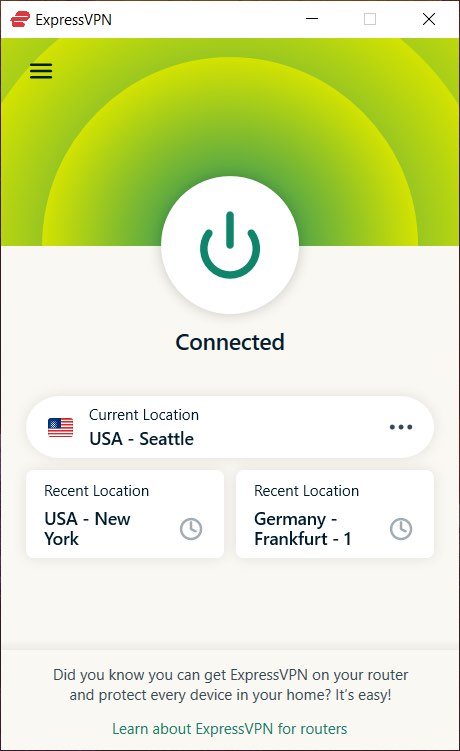
To access more features and settings, you will need to click the three lines in the top-left corner, which will open up a second window. This can be a bit confusing, but it also keeps the main app screen less cluttered.
Similarly, when you want to switch servers with ExpressVPN, you will need to either click one of the two options at the bottom of the app or click the active server to open up a second window of server locations. While NordVPN keeps everything in the main app screen, ExpressVPN relies on a second screen popup for more options.
ExpressVPN has recently upgraded its service to allow for 8 active connections to the VPN network.
NordVPN apps
In contrast to ExpressVPN, NordVPN apps take up a bit more space but also include more options. You can see on the left side of the NordVPN client the specialty servers and country locations. You can also quickly select a server location with only one click from the global map, as you can see below:
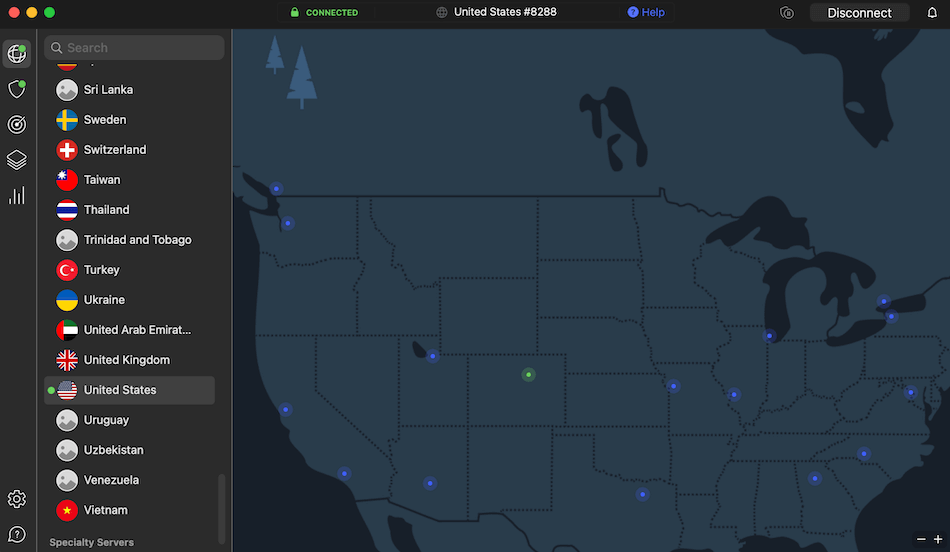
In comparison to ExpressVPN, the NordVPN Windows app is larger, but it also gives you easier access to features, server locations, and specialty servers, without having to open up second windows. This is a big advantage and one reason we ranked it as one of the best VPNs for PC users.
NordVPN allows for 10 active connections to the VPN network at any one time.
Ultimately, this all comes down to user preference. Both ExpressVPN and NordVPN offer good VPN apps.
Winner for VPN apps: Tie
ExpressVPN vs NordVPN speed tests in 2024
Based on all of the speed tests we ran for this comparison, NordVPN is faster than ExpressVPN with all server locations tested.
Speed testing variables – I ran all tests for this NordVPN vs ExpressVPN speed comparison on a 1,000 Mbps connection, using the same test machine. I used the official VPN app for each service, along with the best protocols for speed and security:
- ExpressVPN’s Lightway protocol – This is a new proprietary protocol that was released by ExpressVPN. It promises to be faster and more secure than OpenVPN.
- NordVPN’s WireGuard protocol – The WireGuard VPN protocol continues to gain popularity because it is faster and more secure than other VPN protocols. NordVPN’s implementation of the WireGuard VPN protocol is called NordLynx.
First up were speed tests with servers in the United States. Now let’s examine the test results.
Server speeds in the US
ExpressVPN server in Seattle: 329 Mbps
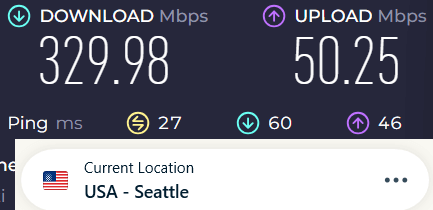
This is a good, but not great test result. And it is a bit disappointing considering that this result is with ExpressVPN’s Lightway protocol. We found ExpressVPN speeds with OpenVPN to be significantly slower as well. Can NordVPN do better?
NordVPN server in Seattle: 755 Mbps

This is one of the fastest VPN speed test results we have ever clocked, approaching 756 Mbps. At least on this particular test, we can see that NordVPN is significantly faster than ExpressVPN. It’s already clear that the WireGuard VPN protocol gives NordVPN a big advantage.
Next, I tested servers in Los Angeles, California.
ExpressVPN server in Los Angeles: 296 Mbps
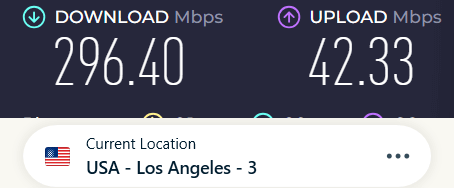
NordVPN server in Los Angeles: 636 Mbps

Once again, NordVPN outperformed ExpressVPN in this server location by a large margin.
I then ran tests for servers in New York, with similar test results.
ExpressVPN server in New York: 270 Mbps
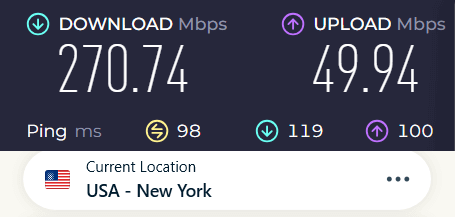
We can still see here that ExpressVPN’s Lightway protocol simply cannot achieve the speeds we are getting with NordVPN’s WireGuard (NordLynx) protocol.
NordVPN server in New York: 613 Mbps

This was the slowest VPN speed test result I got with NordVPN — and it was still significantly faster than ExpressVPN.
Long-distance speed tests in the UK
I also ran a few long-distance speed tests with servers in the UK. The results were similar to before, with NordVPN coming out on top.
ExpressVPN server in the UK: 246 Mbps
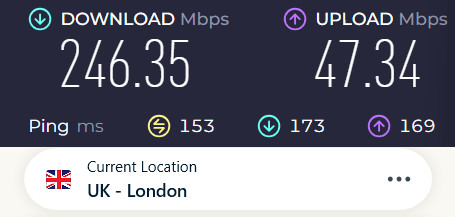
NordVPN was much faster on this transoceanic test as well.
NordVPN server in the UK: 592 Mbps

Here again, NordVPN is significantly faster than ExpressVPN for the UK server location. Even with the long distances, I was still able to achieve nearly 600 Mbps with NordVPN.
We can see that both NordVPN and ExpressVPN are fast, but NordVPN offers serious performance advantages, which is a big reason we rated it as the best VPN for gaming, where ping and speeds are important.
ExpressVPN’s slow OpenVPN speeds
While all of the ExpressVPN speed tests above were conducted with the Lightway protocol, we also need to discuss OpenVPN speeds.
In years past, I could normally get around 150 Mbps or more with ExpressVPN and the OpenVPN protocol. Unfortunately, in all of my recent OpenVPN speed tests, ExpressVPN was significantly slower than NordVPN.
ExpressVPN speeds with OpenVPN: 35 to 60 Mbps

This is pretty slow in comparison to NordVPN’s speeds with the OpenVPN protocol.
NordVPN speeds with OpenVPN: 190 to 270 Mbps
For those who want to stick with the OpenVPN protocol, NordVPN offers a big performance advantage over ExpressVPN in this area as well. Even with double-VPN servers, where traffic is encrypted over two separate hops, NordVPN was still faster than ExpressVPN’s OpenVPN speeds. Here is the NordVPN double-VPN server configuration (US – Canada) coming in at 214 Mbps.

Note: ExpressVPN does not provide any double-VPN server configurations or specialty servers as we find with NordVPN.
Conclusion on speeds: Based on all of our speed tests, NordVPN is significantly faster than ExpressVPN in all the server locations we tested. NordVPN beats ExpressVPN with both the WireGuard and OpenVPN protocols with all server locations. Here is a table recapping the ExpressVPN vs NordVPN speed test results:
| Location | NordVPN | ExpressVPN |
| Seattle | 755 Mbps | 329 Mbps |
| Los Angeles | 636 Mbps | 296 Mbps |
| New York | 613 Mbps | 270 Mbps |
| United Kingdom | 592 Mbps | 246 Mbps |
| OpenVPN | 214 Mbps | 41 Mbps |
Winner for speed: NordVPN by a large margin
Reliability: Is NordVPN or ExpressVPN better?
In terms of reliability, both NordVPN and ExpressVPN are great options.
First, we will take a look at NordVPN.
NordVPN reliability
With the most recent round of tests for the NordVPN review, I found everything to work very well. NordVPN offers excellent reliability in the following areas.
- Applications: The apps work great without any bugs or crashes.
- Servers: The servers were reliable and fast with no issues to report.
- Connections: Connections were stable and fast to connect.
In terms of reliability, we found no problems with NordVPN. It is a reliable VPN.
ExpressVPN reliability
Similar to NordVPN, ExpressVPN also does well in terms of reliability. But it’s not quite on par with NordVPN.
- Applications: Every ExpressVPN app we tested was well-designed and easy to use with no crashes, bugs, or issues.
- Servers: There is more variability in speed with ExpressVPN than with NordVPN, especially if you are using the OpenVPN protocol.
- Connections: ExpressVPN has stable VPN connections, although OpenVPN takes a while to connect.
One big issue with ExpressVPN in terms of reliability is accessing streaming content. We’ve noted over the past year that ExpressVPN is not very reliable with streaming. Specifically, it can have problems with unblocking some streaming platforms, but they are improving, as we’ll cover more below.
NordVPN wins this category.
Reliability Winner: NordVPN
Features comparison in 2024
ExpressVPN and NordVPN each have some good features for different types of users. Nonetheless, there is a big distinction in this category.
| Feature | NordVPN | ExpressVPN |
|---|---|---|
| Split tunneling | Yes | Yes |
| RAM-only servers | Yes | Yes |
| Kill Switch | Yes | Yes |
| Private DNS | Yes | Yes |
| Logs | No logs (audited) | No logs (audited) |
| Multiple VPN protocols | Yes | Yes |
| Browser extensions | Yes | Yes |
| Built-in ad blocking | Yes | Yes |
Now we’ll take a look at specialty servers.
| Servers | NordVPN | ExpressVPN |
|---|---|---|
| Double VPN servers | Yes | No |
| Obfuscated (stealth) servers | Yes | Yes |
| Onion over VPN servers | Yes | No |
| P2P servers (for torrenting) | Yes | No |
| Dedicated IP servers | Yes | No |
We can see right away that NordVPN has an advantage with features.
ExpressVPN has fewer features than NordVPN
ExpressVPN is a pretty basic VPN. As we noted above, it offers basic and user-friendly VPN apps, simply because there are not a lot of features to showcase, unlike NordVPN.
One of the main features of ExpressVPN is the split tunneling VPN option. This lets you route certain apps through the encrypted VPN while routing other apps to the internet over your regular (unencrypted) connection. This is not a very unique feature and we also find it with NordVPN and ProtonVPN.
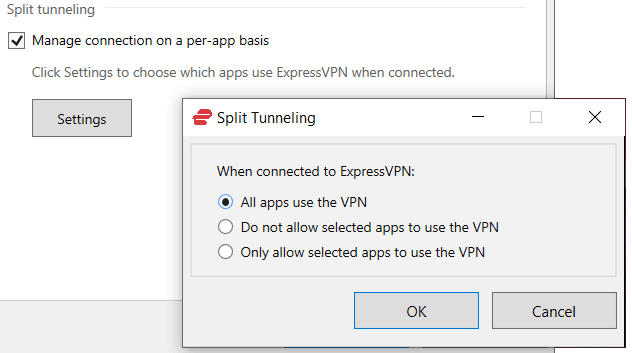
Overall, I don’t see much use for a split tunneling feature. Additionally, NordVPN also offers a split tunneling feature with mobile apps.
Lightway – We already discussed Lightway above in the speed tests section, where we saw that it was nowhere near as fast as WireGuard with NordVPN. Aside from the performance drawbacks, we should also note that Lightway is only being used with ExpressVPN (limited adoption).
ExpressVPN’s Threat Manager feature
Another new feature with ExpressVPN is what they are calling Threat Manager. This is an interesting feature that is very similar to NordVPN’s Threat Protection feature, but much more limited. ExpressVPN describes the feature as a tool to “block app trackers” on your device. From the ExpressVPN support page:
Threat Manager prevents all apps and websites you visit on your device from communicating with the third-party companies in our blocklist.
ExpressVPN’s feature works similar to what we find with NordVPN and CyberGhost on the surface. However, in our tests of the Threat Manager feature, it did not work well at blocking ads on our devices, and this suggests it’s only for trackers.
Additionally, the Threat Manager feature did not work at all on Linux. Currently, Threat Manager is only available for iOS, macOS, and Linux. This means that this feature is not available for Windows or Android platforms at this time, which makes it hard to recommend.
While there are other noteworthy aspects of ExpressVPN’s service, such as running all servers in RAM-disk mode, these are not really features. So let’s move on to NordVPN, where things get a bit more exciting.
NordVPN has more features than ExpressVPN
The features category is a big distinction between NordVPN and ExpressVPN.
First, we will look at NordVPN’s specialty servers, which are servers for different use cases. Unlike NordVPN, ExpressVPN does not offer any of these specialty servers. Here’s what you get with NordVPN:
- Double-VPN servers encrypt traffic over two separate hops. This adds an additional layer of encryption and security, without sacrificing on speed.
- Tor-over-VPN servers encrypt traffic with the Tor Network, in addition to the VPN server. While there is a performance tradeoff here due to the Tor network, this is another useful feature.
- P2P servers are optimized for torrenting traffic, with excellent speeds.
- Dedicated IP servers for times when you need to have a fixed IP address while still getting the protection of a VPN.
- Obfuscated servers conceal VPN traffic to look like regular HTTPS encryption. This is a great feature to use if you need a VPN for China, the UAE and Dubai, Russia, or any other restricted network situation where VPNs may be blocked.
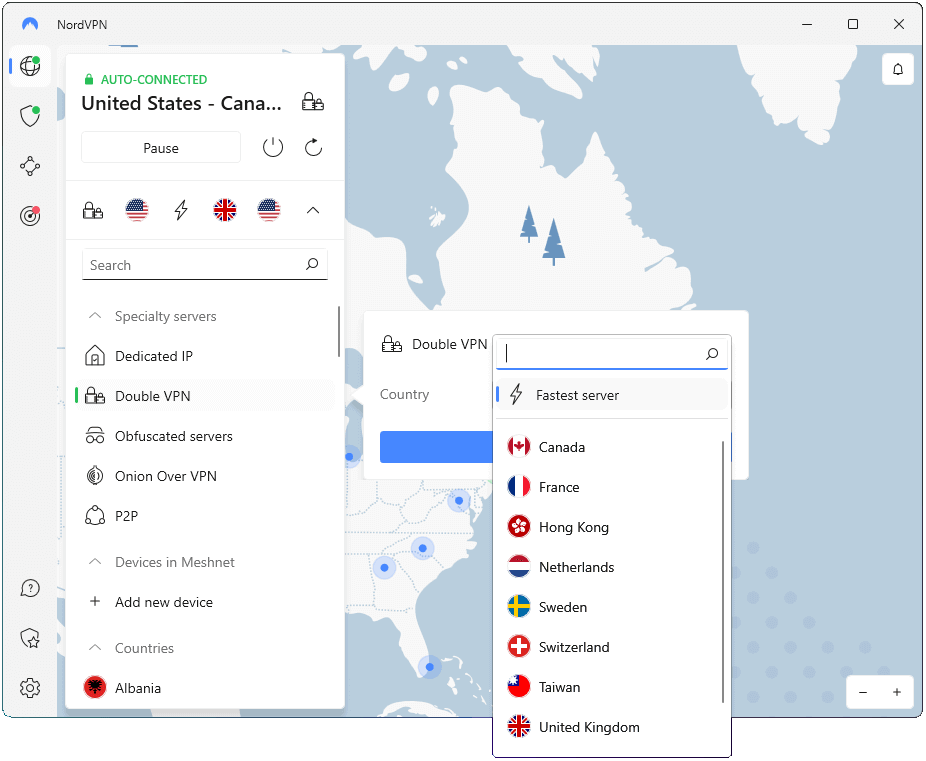
I found these servers to perform well in my testing. This is a feature we see with both NordVPN and Surfshark. The P2P servers also worked great with fast speeds and no internet connection issues.
NordVPN’s Threat Protection and Threat Protection Lite
Last year NordVPN launched Threat Protection and Threat Protection Lite. Threat Protection Lite essentially blocks ads, trackers, malware, and phishing domains through the VPN. It is available for Linux, Android, iOS, and NordVPN browser extensions.
Threat Protection does everything that Threat Protection Lite does. It also has features similar to an antivirus in that it can scan downloaded files for threats, and delete corrupted ones before they can do any harm. Most importantly, Threat Protection works even when you are not connected to a VPN server. This feature is available in the Windows and macOS desktop apps.
The following table compares the features of ExpressVPN Threat Manager, NordVPN Threat Protection, and NordVPN Threat Protection Lite:
| ExpressVPN Threat Manager | NordVPN Threat Protection | Threat Protection Lite | |
| Blocks Ads | yes | yes | yes |
| Blocks Trackers | yes | yes | yes |
| Blocks Malicious Websites | yes | yes | yes |
| Scans for Web Malware | yes | yes | yes |
| Scans Downloads for File Malware | no | yes | no |
| Requires Active VPN Connection | yes | no | yes |
| Platforms | Windows, macOS, Android, iOS | Windows, macOS | Windows, macOS, Android, iOS, Linux, Browser Extensions |
As you can see from the table, NordVPN’s Threat Protection feature is much more capable than ExpressVPN’s Threat Manager. With NordVPN, the feature is more robust and effectively blocks more harmful stuff from getting on your device. Additionally, the VPN does not need to be on for it to work. This gives NordVPN an advantage over ExpressVPN, and also makes it the best VPN with ad blocking.
Below is a screenshot of the Threat Protection feature that we tested out for this comparison report. You can see that enabling Threat Protection is as simple as hitting the toggle switch at the top. Additionally, you can see all of the domains being blocked in the Window below.
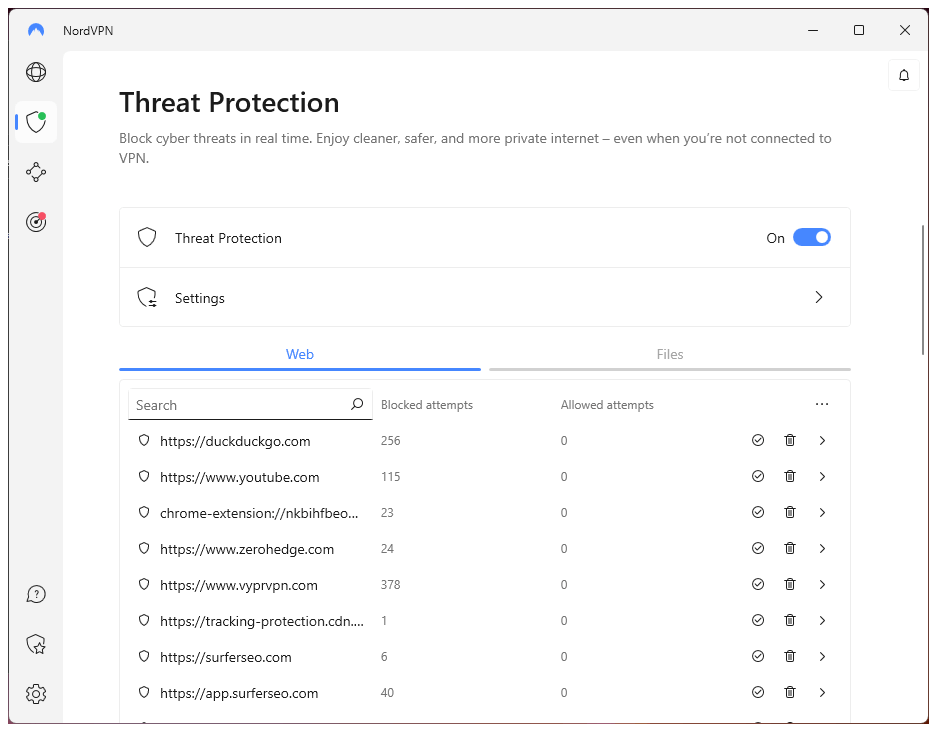
WireGuard – NordVPN’s implementation of the WireGuard protocol (NordLynx) is another great feature. While we already covered the great speed test results above, here are some other benefits of WireGuard with NordVPN:
- Instant connection times (can establish a connection in less than one second)
- Seamless transition between networks, such as when switching from WiFi to 4G
- Better battery life with mobile devices
- More reliability and fewer dropped connections.
ExpressVPN and NordVPN servers
Here is a table highlighting the differences in server count between ExpressVPN and NordVPN:
| Servers | ExpressVPN | NordVPN |
| Total | 3,000+ | 6,300+ |
| Countries | 105 | 111 |
| Specialty Servers | No | Yes |
NordVPN clearly has ExpressVPN beat in the server category. In comparison to ExpressVPN, NordVPN offers:
- More servers
- More server locations
- Many specialty servers
In terms of the geographic server locations, NordVPN has a slight edge with 111 country locations, while ExpressVPN has locations in 105 countries.
Both of these VPN services use virtual servers. To elaborate, a virtual server location is a server that is physically located in one country but is configured to appear as if it’s in another. This is often done to provide coverage in regions where it’s difficult to host a server due to various reasons such as legal restrictions, high costs, or lack of infrastructure.
Features winner: NordVPN
Security and encryption
In the security category, both NordVPN and ExpressVPN do very well. However, there is only one winner in this area.
Encryption comparison
Both ExpressVPN and NordVPN utilize strong encryption standards, as you can see in this table:
| Item | ExpressVPN | NordVPN |
| Cipher | AES-256, ChaCha20 | AES-256, ChaCha20 |
| Authentication | SHA-512, Poly1305 | SHA-256, Poly1305 |
| RSA Key | 4,096-bit | 4,096-bit |
NordVPN and ExpressVPN basically offer the same levels of encryption and both are secure. The slight difference in hash authentication is rather trivial as both offer a high level of security that is considered unbreakable by today’s standards.
VPN protocols with ExpressVPN and NordVPN
Both NordVPN and ExpressVPN support all of the main VPN protocols.
- ExpressVPN: OpenVPN UDP, OpenVPN TCP, IPSec/IKEv2, IPSec/L2TP, and Lightway protocol
- NordVPN: OpenVPN UDP, OpenVPN TCP, IPSec/IKEv2, IPSec/L2TP, and WireGuard
The big difference here is that NordVPN is using a widely-accepted, open-source protocol with WireGuard. Meanwhile, ExpressVPN has opted for a self-developed Lightway protocol that is not being used by anyone else. Another problem with Lightway is that it is not integrated into the OS kernel like WireGuard is with Linux and Windows.
When it comes to protocols, NordVPN has an advantage over ExpressVPN.
Server security with NordVPN and ExpressVPN
In terms of server security, both of these VPNs have some similarities and differences.
Here are some noteworthy aspects of ExpressVPN’s server network:
- All servers running in RAM-disk mode. These servers have no disk drives, and store all their data in volatile RAM memory. This offers a higher level of security and also ensures no server can physically store any data because there are no physical drives for it to be stored upon.
- Uses some virtual server locations. This is a drawback with ExpressVPN that you will not find with NordVPN.
- Does not use colocated servers, but instead rents servers from third parties.
Now let’s examine NordVPN:
- All servers run in RAM-disk mode (just like with ExpressVPN).
- Does not use any virtual server locations. Instead, all servers are running on dedicated physical hardware in secure data centers (another advantage over ExpressVPN.
- Is rolling out colocated (self-owned) servers throughout the network. NordVPN has already implemented colocated servers in most locations, and the entire network will probably be converted by the time you read this. This means no more rental servers from third parties, as we see with ExpressVPN.
NordVPN comes out on top in the server security category.
Leak protection
Both NordVPN and ExpressVPN do very well in terms of leak protection. With the NordVPN and ExpressVPN desktop clients, they both offer:
- IP address leak protection (for both IPv4 and IPv6)
- DNS leak protection
- Kill switch to block traffic if the VPN connection drops
Once again, however, NordVPN offers more customization with its VPN kill switch. NordVPN allows you to enable two different types of kill switches, even at the same time:
- Internet Kill Switch – This will block all internet traffic if your VPN connection drops for any reason.
- App Kill Switch – This will close out specific apps (that you select) if the VPN connection drops.
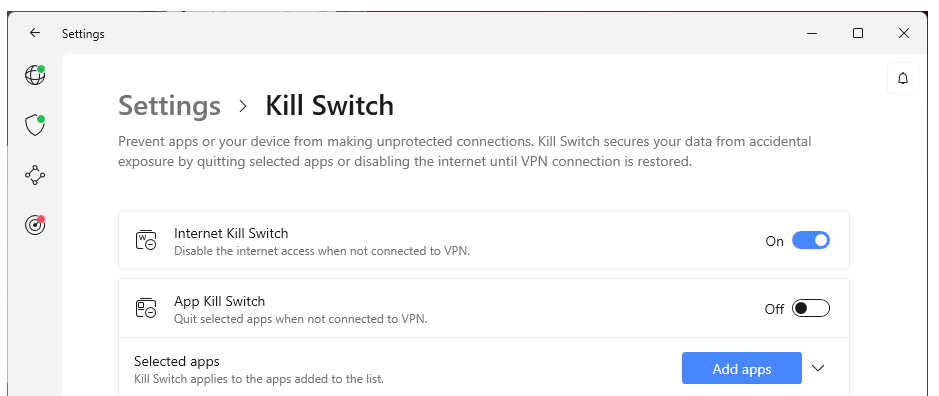
I thoroughly tested all leak protection features in each of the respective reviews using these VPN test procedures. The results were great: (no leaks) for either VPN service. This third sub-category is a tie, although NordVPN has a better kill switch feature with more customization options.
Recent Audits – Finally, for the icing on the cake, NordVPN has also undergone a full third-party infrastructure and app security audit conducted by Cure53. This further bolsters the VPN’s claims beyond mere marketing.
Overall Security winner: NordVPN
See all NordVPN security features here >>
Note: Both NordVPN and ExpressVPN support VPN routers. Running a VPN on your router can be useful if you need a VPN for Apple TV or any other device that does not natively support VPNs. However, ExpressVPN has a dedicated router app, which makes it easier to use on routers than NordVPN.
Logs and Privacy: Is NordVPN or ExpressVPN best?
When it comes to privacy and logs, NordVPN and ExpressVPN are great options. Both of these VPNs are verified as no logs VPNs. We’ll examine both.
NordVPN logging policy
NordVPN has a strict no-logs policy, as explained on its website:
We do not store connection timestamps, session information, used bandwidth, traffic data, IP addresses, or other data. Nothing to store – nothing to share with anyone.
Verification: NordVPN is one of the few services that has undergone multiple third-party audits. Its logging claims were verified when they voluntarily subjected their servers, VPN infrastructure, and staff to a third-party audit to verify their logging policies.
NordVPN has now undergone four separate no-logs audits conducted by PWC AG. The first two audits were completed by PWC AG in Zurich, Switzerland. The latest NordVPN audit was completed by Deloitte.
ExpressVPN logging policy
Fortunately, ExpressVPN also has a straightforward no-logs policy:
ExpressVPN stores no activity logs and no connection logs from our users. Here’s what that means:
No activity logs. ExpressVPN does not see or record which websites you visit. We never log the destination or contents of your traffic, and we run our own private, zero-knowledge DNS on every VPN server for added privacy and anonymity.
No connection logs. ExpressVPN never logs connection timestamps, session duration, your source IP address, or the ExpressVPN IP address that your computer assumes when connected to the VPN.
Verification: ExpressVPN has also undergone two third-party no-logs audits. The first audit was also performed by PWC and verified the no-logs policy and privacy protection measures are in place. The October 2022 audit was conducted by KPMG, according to the International Standard on Assurance Engagements (ISAE) (UK) 3000 Type 1. The auditors gave ExpressVPN a “clean bill of health.”
ExpressVPN was purchased by a conglomerate (Kape Technologies) in 2021
In September 2021, news broke that Kape Technologies purchased ExpressVPN. We covered all the important details in the link above. Kape also owns Private Internet Access, as we covered in the NordVPN vs PIA comparison. Ultimately, we consider this to be a strike against ExpressVPN in the trust/privacy category.
Logs and privacy winner: NordVPN
ExpressVPN and NordVPN jurisdictions
Both ExpressVPN and NordVPN are based in good privacy jurisdictions.
NordVPN in Panama – Panama is not a member of the 14 Eyes countries and is considered to be a good offshore privacy jurisdiction that is safe from US and European influence.
ExpressVPN in the British Virgin Islands (BVI) – The BVI is also considered a good jurisdiction. The BVI is not a member of 5/9/14 Eyes surveillance groups and it is a free and independent country, with its own legal and judicial system, despite its historical ties to Britain.
Both Panama and the British Virgin Islands have strong privacy protections in place, making them popular locations for banking and other businesses that demand high levels of privacy. While jurisdiction is a key consideration for privacy reasons, threat actors continue to exploit victims around the world, regardless of jurisdiction.
Jurisdiction winner: Tie
Torrenting: Is ExpressVPN or NordVPN better?
| NordVPN | ExpressVPN | |
| Torrenting Support | All servers | All servers |
| Dedicated P2P Servers | Yes | No |
| Plans that Support Torrenting | All plans | All plans |
| Download Speeds | Very Fast | Fast |
Once again, both ExpressVPN and NordVPN are good options for torrenting. But again there is a difference in this category.
When looking for the best VPN for torrenting there are two things to consider:
- Speeds: NordVPN was the big winner in all of our speed tests. It offers the fastest speeds for torrenting over ExpressVPN.
- Leak protection: ExpressVPN and NordVPN both offer great leak protection. Each incorporates a kill switch into the VPN apps to protect your traffic. This will keep your IP address and location secure when torrenting files. If the connection to the VPN drops, you will still be protected if you have the kill switch activated.
While both ExpressVPN and NordVPN offer secure VPN apps with built-in leak protection, the big difference is in speeds, where NordVPN comes out on top. If you want to torrent with your VPN, NordVPN’s speeds will give you an edge over ExpressVPN.
NordVPN also offers dedicated P2P servers, which are optimized for fast torrenting speeds. I tested this out for this comparison and NordVPN’s P2P servers performed well. ExpressVPN does not offer any P2P servers.
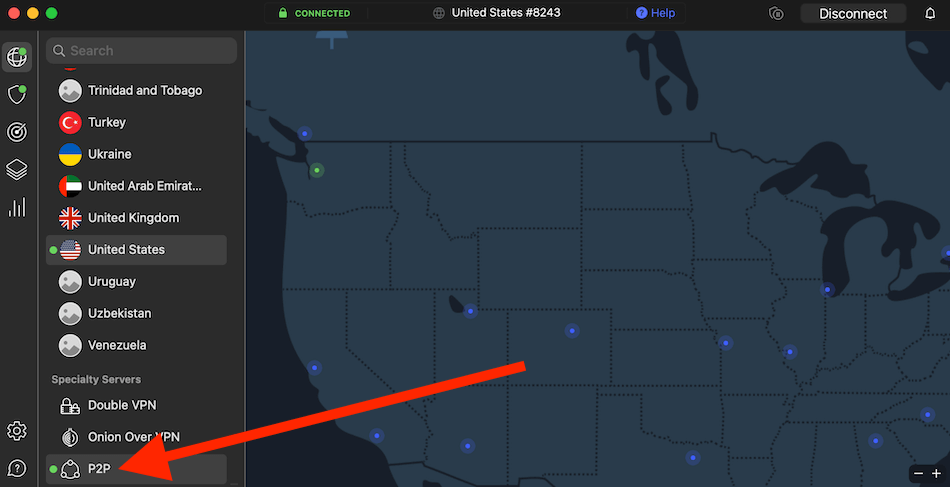
Given the faster speeds and dedicated P2P servers, NordVPN wins this category as well.
Torrenting winner: NordVPN
Learn more about NordVPN and torrenting here >
Netflix and streaming comparison
| NordVPN | ExpressVPN | |
| Supported Netflix Libraries | 20+ | 11+ |
| Plans with Streaming Support | All plans | All plans |
| App for Smart TV? | Yes | Yes |
| App for Firestick / Fire TV? | Yes | Yes |
As someone who enjoys streaming American Netflix, I’ve tested many services to find the best VPNs that work with Netflix. Fortunately, both NordVPN and ExpressVPN work well for accessing Netflix.
ExpressVPN Netflix – ExpressVPN offers 24/7 access to Netflix, but only for a select few regions. While it is generally a good VPN for Netflix, it comes with a few drawbacks:
- Fewer Netflix regions are supported. The main regions supported by ExpressVPN are the USA, Japan, and the UK, but a few other regions may also work.
- Slower speeds (but you should still have plenty of speed to stream Netflix in HD with ExpressVPN).
In comparison to ExpressVPN, NordVPN simply works better For Netflix and streaming in general.
NordVPN Netflix – NordVPN currently supports a larger number of Netflix libraries. Officially, NordVPN supports 14 different Netflix libraries, including the US, UK, Canada, Germany, France, Italy, Netherlands, Spain, Japan, Australia, India, Brazil, South Korea, and Finland. This is far more Netflix regions than you will find with ExpressVPN.
In addition to having more access to different Netflix libraries, NordVPN also gives you better speeds for streaming, as we covered above. Below I’m testing out NordVPN with Netflix; everything worked well:
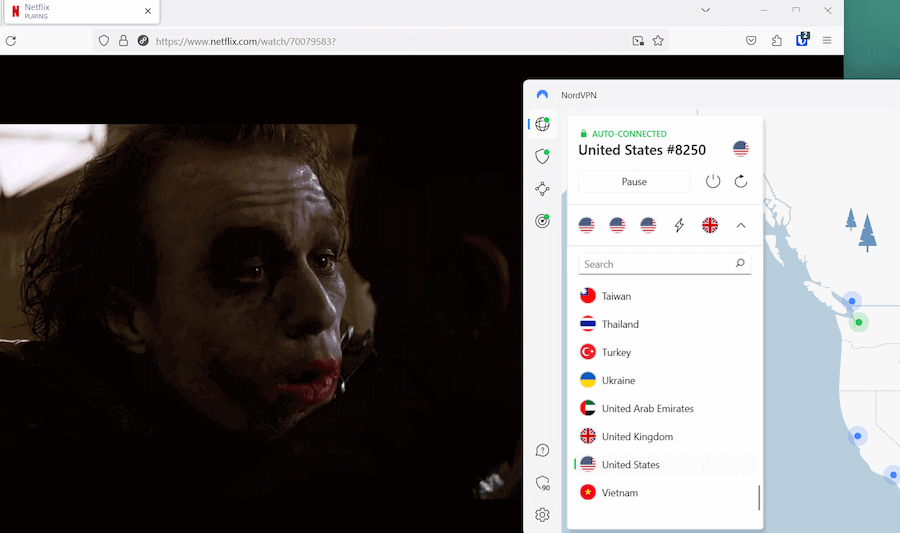
NordVPN is the clear winner when it comes to streaming Netflix. But what about other streaming services?
Other streaming services
ExpressVPN – Generally speaking, ExpressVPN does well with streaming. However, it has suffered from outages over the past few years, particularly with BBC iPlayer and Netflix. Fortunately, in our latest test for our guide on the best VPN for BBC iPlayer, we found ExpressVPN to perform well.
Note: We also observed ExpressVPN’s problems with streaming in our tests for the Surfshark vs ExpressVPN comparison. This may have changed, however, with VPN streaming always being a cat-and-mouse game.
NordVPN – Just like with access to a larger selection of Netflix libraries, NordVPN also provides access to a larger number of streaming services. This gives NordVPN a big advantage over ExpressVPN in the streaming category.
NordVPN consistently works with Disney Plus, Amazon Prime, ESPN, HBO, DAZN, Hulu, BBC iPlayer, and many others. It is one of the best all-around VPNs for streaming on the market.
Both NordVPN and ExpressVPN offer dedicated apps in the Amazon Store if you need a VPN for Smart TV or a VPN for Firestick and Fire TV.
Netflix and streaming winner: NordVPN
See NordVPN’s streaming capabilities here >
Price comparison
In terms of price, NordVPN is the winner with the cheapest rates.
Here is a brief breakdown of the pricing with both ExpressVPN and NordVPN:
| Time | NordVPN | ExpressVPN |
| Monthly | $11.95 | $12.95 |
| 6-months | N/A | $9.99/mo |
| 1-year | $4.92/mo | $6.67/mo |
| 2-year | $2.99/mo | N/A |
| Coupon: | 74% Off Coupon | 49% Off Coupon |
NordVPN offers the cheapest price with a two-year discounted rate of $2.99 per month. ExpressVPN is more than double the price of NordVPN when looking at the cheapest monthly rates. NordVPN is currently the best cheap VPN, offering a high-quality service at under $4 per month.
Note: In addition to their Standard subscriptions, NordVPN now offers Plus and Complete subscriptions. These offer additional features such as a cross-platform password manager, a data breach scanner, and 1 TB of encrypted cloud storage. If you need those additional features, opting for one of these expanded subscriptions could be a more economical way to go instead of subscribing to each component separately.
ExpressVPN does not offer any free trial, nor do they offer two-year plans. The discounted 15-month rate does offer some good savings (below the standard price of $8.32/month without the coupon). Regarding temporary sales, ExpressVPN remains consistent in its pricing, as explained in my ExpressVPN coupon guide.
Price winner: NordVPN
Payments and Refunds: NordVPN vs ExpressVPN
Now we’ll examine payment options and refunds for both ExpressVPN and NordVPN.
ExpressVPN – ExpressVPN supports a wide range of payment options, including all major credit cards, PayPal, Bitcoin, as well as other payment processors.
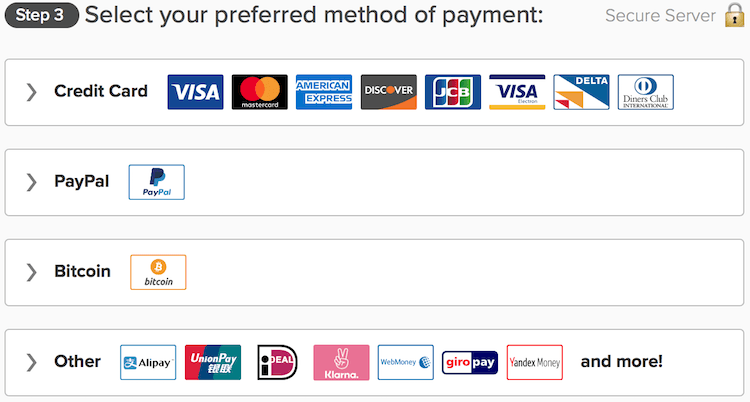
You only need to enter a valid email address and your payment details with ExpressVPN.
NordVPN – NordVPN also supports many payment options, including a good selection of cryptocurrency payment options, as well as PayPal. Note that the payment options may vary depending on your location.
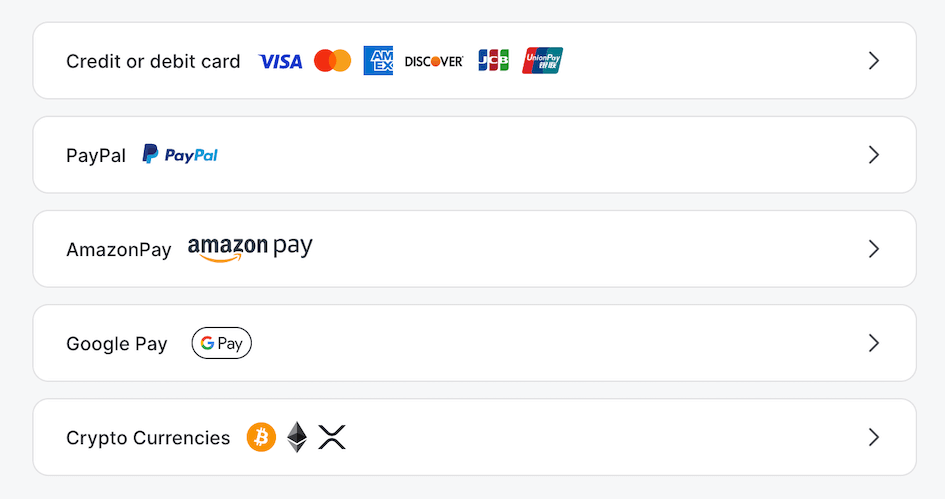
Note: NordVPN occasionally offers discounts and special packages, such as around the holidays. This is explained on my NordVPN coupon page which tracks the latest deals.
Refunds – Both ExpressVPN and NordVPN offer a 30-day money-back guarantee.
This category is a tie. ExpressVPN accepts PayPal, NordVPN accepts more cryptocurrencies, and both offer a 30-day money-back guarantee.
Payment options and refunds winner: Tie
Is ExpressVPN or NordVPN the best value?
Last, but not least, is the question of value.
Which VPN offers the best value for your money?
In comparison to ExpressVPN, NordVPN simply offers more bang for your buck:
- Faster speeds
- More privacy and security features
- Better performance with streaming and torrenting
- Cheaper prices
Considering all this, NordVPN is the clear winner in the value category.
Value winner: NordVPN
Conclusion: NordVPN wins in 2024
The results of our testing and research are clear. While ExpressVPN is an excellent product, we must conclude that NordVPN is better than ExpressVPN. NordVPN was the winner in nine categories.
These categories spanned various aspects of VPN performance, such as speed, server coverage, security features, and customer support. NordVPN consistently outperformed ExpressVPN, demonstrating superior capabilities and delivering an overall smoother user experience.
This isn’t to say that ExpressVPN didn’t put up a good fight. It excels in certain areas and is a solid choice for many users. However, when considering the overall package, NordVPN emerged as the overall better option. We’ve seen other users come to the same conclusion on NordVPN and ExpressVPN Reddit discussions.
To summarize our findings in this NordVPN vs ExpressVPN comparison, here are the winners for each category:
| Category | Winner |
| Speeds: | NordVPN |
| Reliability: | NordVPN |
| VPN Apps: | Tie |
| Features: | NordVPN |
| Security: | NordVPN |
| Logs & Privacy | NordVPN |
| Jurisdiction | Tie |
| Torrenting | NordVPN |
| Netflix & Streaming | NordVPN |
| Price | NordVPN |
| Payments & Refunds | Tie |
| Value | NordVPN |
Overall winner: NordVPN
While we like and recommend both of these VPN services, we believe that NordVPN is the better option. It has made massive progress over the past few years and has overtaken ExpressVPN in most categories, especially in the areas of performance, features, and streaming.
It is for all of these reasons and more that we consider NordVPN to be the best all-around VPN service and give it our top recommendation.
At the end of the day, either of these two VPNs may be the best service for you. It all depends on your needs and uses for the VPN. Whichever service you decide to go for, be sure to get the best price via the discounts below:
NordVPN’s Cyber Deal is live:
Get 74% Off NordVPN plus an extra 3 months FREE below:
(Coupon is applied automatically; 30 day money-back guarantee.)
And now for ExpressVPN.
Right now, 49% off is the best deal you can get on ExpressVPN. Even with the discount, ExpressVPN is still much more expensive than NordVPN — about double the price.
If you are really still on the fence, keep in mind that ExpressVPN and NordVPN both offer a 30-day money-back guarantee. Therefore you could purchase both VPNs, test each service for a few weeks, and then cancel the one you don’t want for a full refund.
This NordVPN vs ExpressVPN comparison guide was updated on November 1, 2024, with new information and test results.

Leave a Reply